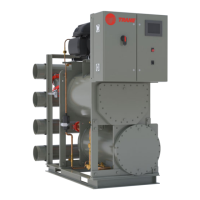8
ARTC-SVX007A-EN
Chiller Description
Chiller Scope
This manual provides relevant data to properly operate,
maintain, and troubleshoot the Trane Thermafit™ TACW.
Operator and maintenance personnel must be a qualified
refrigeration technician and have a working knowledge of
high voltage systems, low voltage control circuits, and
components and functions.
Chiller Capacities
The Thermafit™ TACW modular chillers utilize
independent refrigeration circuits using Turbocor
compressors and flooded shell and tube evaporators and
condensers. They are available from 65-135 tons and up to
8 modules may connect together in a standard primary/
secondary control system. The system consists of a
primary chiller module that contains the primary
microprocessor controller, the power distribution panel, one
or more secondary modules.
These chiller modules consist of an evaporator, condenser,
twin-turbine centrifugal compressor, compressor controller,
and interconnecting refrigerant piping. The chiller requires
connection to the condenser and chilled water circuits, as
well as the main electrical supply and control wiring.
The thermal capacity of these units is dependent on the
leaving temperature of the chilled fluid, maintaining a
minimum flow of fluid through the evaporator and keeping
debris out of the system. In applications where it is desired
to operate with a lower flow rate or higher temperature,
consult the factory for recommendations.
Water quality must be monitored and maintained by a
water treatment professional familiar with the materials of
construction and operation of the equipment. The chiller
modules arrive fully charged with refrigerant. As required
under Federal regulations, installation, initial start-up, and
technical servicing should only be performed by fully
qualified personnel.
System Description
All Thermafit™ TACW modular chillers are designed with a
very small approach to enhance the compressor
performance resulting in an outstanding IPLV rating. Chiller
modules are available in different configurations and with
various standard options including different compressor
models to customize these chillers to your specific
applications.
Standard Features
• ETL and AHRI Certified
• 65 kA SCCR Rating
• One TT350 Danfoss Turbocor Variable Speed,
Magnetic Bearing, Oil-Free Centrifugal Compressor
• Unprecedented Part-Load Performance, High Energy
Efficiency, and Quiet Operation
• 5 percent Line Reactor per Compressor
• Mounted Fused Isolation Switch per Compressor
• Include On Off motorized isolation valve on evaporator
and condenser
• Isolation Valves Located Around All Serviceable
Components
• Dual Manifold Pressure Relief Valve
• Danfoss Turbocor MCX-20 Controller Complete with 10
inch Schneider HMI (Colored Monitor)
• Including a Web Server Allowing Remote Internet
Monitoring, Remote Control, and Access to Operational
Logs and Software Updates
• Bacnet/LonWorks/ModBus Included Standard
• Shell and Tube and Evaporator and Condenser
• ASME/CRN Certified Cleanable Flooded Shell and
Tube Condenser, with Standard 150psi Design
Pressure
• Standard Flow Switch Located at Evaporator and
Condenser Hydronic Inlets
• An Electronic Expansion Valve per Circuit Providing
Precise PLC Controlled Refrigerant Flow
• 3/4 inch (19mm) Closed-Cell Insulation
• First Year Parts and Labor Warranty
Chillers are leak and pressures tested at 200 psig at high
side, 150 psig at low side, then evacuated and charged.
Self-contained chillers are equipped with a single source
power source and integral hydronic piping.
Unit panels, structural elements and control enclosure are
constructed of heavy-gauge powder coated aluminum and
mounted on sand blasted welded structural steel base and
painted with two parts epoxy paint for weather protection.
Optional Features
• Header System including 4 headers and steel frame
• Evaporator/Condenser Waterbox Hinges
• Evaporator/Condenser 300 PSI Waterbox
• Epoxy Coated Condenser/Evaporator
• Full/Partial Knockdown
• Low Lift Pump
• Harmonic Filters
• Remote Monitoring
• Compressor Wraps
• Isolation Pads
• 1.5 inch Insulation

